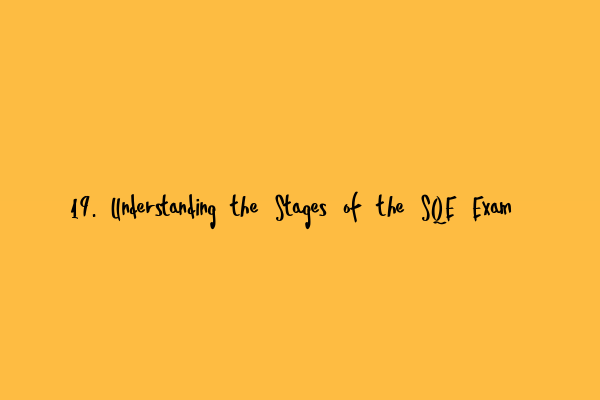Understanding the Stages of the SQE Exam
If you’re pursuing a career in law, you’re probably aware of the Solicitors Qualifying Examination (SQE) that will replace the current route to qualification in England and Wales. The SQE is designed to assess candidates’ competence in a more practical and skills-based way. It consists of several stages that aspiring solicitors need to navigate successfully in order to qualify. In this article, we will walk you through the different stages of the SQE exam and provide you with valuable insights to help you succeed.
1. SQE Stage 1: Functioning Legal Knowledge
The first stage of the SQE exam is known as Functioning Legal Knowledge (FLK). This stage primarily focuses on testing your understanding of core legal principles and concepts. It assesses your ability to apply legal knowledge to practical scenarios and evaluate the impact of the law on different situations. FLK consists of two written assessments, each comprising 180 multiple-choice questions and 12 case studies. It is essential to prepare thoroughly for this stage by studying the SRA syllabus and familiarizing yourself with the key topics and principles.
If you’re looking for additional resources to enhance your knowledge and preparation, SQE webinars can be a valuable tool. Our in-depth article on SQE Webinars provides insights into various online learning platforms that offer expert guidance and insights to help you unlock your knowledge and enhance your understanding of the FLK stage.
2. SQE Stage 2: Practical Legal Skills
Once you have successfully passed the FLK stage, you will progress to the second stage of the SQE exam – Practical Legal Skills (PLS). This stage assesses your practical skills, such as legal research, writing, drafting, client interviewing, and advocacy. It consists of six practical assessments, covering these essential skills. The assessments are designed to mimic real-life legal scenarios that aspiring solicitors might encounter in their professional careers.
When preparing for the PLS stage, it’s crucial to choose the right SQE course provider. A thorough review of SQE course providers can help you find the best fit for your learning requirements and ensure you receive the necessary training and support to excel in this stage. Take a look at our comprehensive article on SQE Course Providers to make an informed decision and choose the right provider for your needs.
3. SQE Stage 3: Qualifying Work Experience
Once you have successfully completed the first two stages of the SQE exam, you will move on to the third and final stage – Qualifying Work Experience (QWE). This stage is aimed at assessing candidates’ competence in a professional working environment. It requires candidates to have a minimum of two years of full-time equivalent work experience, which can be gained before, during, or after completing the SQE exam.
While the SQE does not specify the type of work experience that qualifies, it is essential to choose work placements that will allow you to gain relevant legal experience and demonstrate your skills. This experience will validate your ability to apply your legal knowledge and practical skills in real-world scenarios.
If you’re seeking tips and tricks to excel in the SQE exam and make the most out of your study and preparation, our article on Insider Tips and Study Tricks for Success in the SQE can be of great value. It provides you with expert advice and strategies to optimize your study routine and ensure optimal performance in the exam.
Conclusion
Navigating through the stages of the SQE exam is a crucial step towards qualifying as a solicitor in England and Wales. Understanding the requirements and expectations of each stage is key to your success. By thoroughly preparing for the Functioning Legal Knowledge stage, choosing the right SQE course provider for the Practical Legal Skills stage, and gaining relevant work experience for the Qualifying Work Experience stage, you can enhance your chances of qualifying as a solicitor.
Remember, the SQE is a comprehensive assessment that tests both your legal knowledge and practical skills. By utilizing the resources available to you, such as SQE webinars, comprehensive course providers, and expert insights, you can navigate through the stages of the SQE exam with confidence and pave the way to a successful legal career.
If you’re interested in learning more about the grading system in SQE and how exams are evaluated, our article on the Grading System in SQE provides a detailed breakdown of the evaluation process. Additionally, if you would like to explore the SRA syllabus in more depth, our article on Unveiling the SRA Syllabus for the SQE offers valuable insights.
